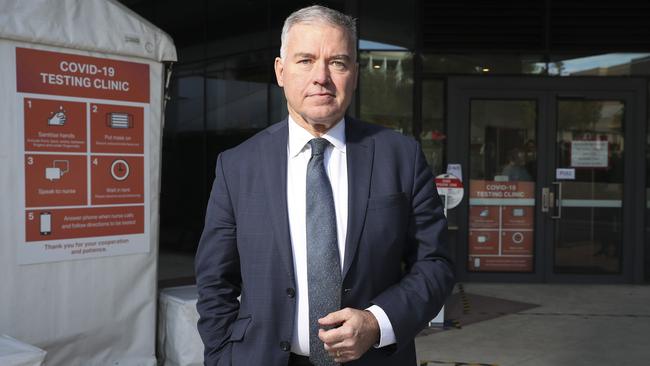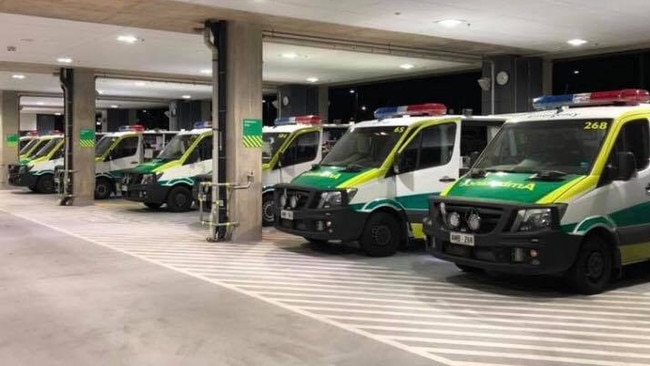SA Health Minister at head of an Australia-wide push for federal government action to help crippled public health system
Health Minister Stephen Wade will lead a combined push by the states for more federal money for hospitals clogged with NDIS patients.
SA News
Don't miss out on the headlines from SA News. Followed categories will be added to My News.
Health and Wellbeing Minister Stephen Wade is steering an Australia-wide drive for urgent action from the federal government to help the nation’s crippled public health system.
Mr Wade will use his new position as chair of all state and territory health ministers to lead the call for more federal funding to help hospitals, which are struggling with chronically clogged emergency departments and ambulance ramping.
He will also ask the federal government to help free up beds that are being occupied by National Disability Insurance Scheme clients waiting for places to be discharged to or those waiting to be moved into aged care.
Last month, there were 163 people with NDIS packages in SA hospital beds medically cleared for discharge but with nowhere suitable to go – a 77 per cent increase on the 92 people in June last year.
This week, there were also 126 patients in hospital beds waiting for placements in residential aged care facilities.
Health ministers from around the country will convene next month to finalise the call to action before a national cabinet meeting where health will be the top priority.

Hospitals around the nation are struggling under the pressure of the health crisis, with bulging emergency departments and ambulance ramping. Mr Wade blamed the crisis on a number of complex issues, including:
– A lack of places for NDIS patients, leaving them stuck in hospital beds; and
– A pandemic hangover of people with complex problems who did not seek medical help at the height of lockdowns, leading to them now needing acute hospital care.
“It is not volume so much as complexity,” Mr Wade said of the pressure on hospitals.
He said SA Health had run a campaign urging people not to delay care but it appeared postponing care, including cancer screenings, was a factor in the national crush on emergency departments.
That delay factor is still evident in the influenza vaccine rollout – new data shows just 45 per cent of Australians aged 18-64 have had their flu vaccine compared with 71.8 per cent at the same time last year.
Two-thirds of Australians 65 and older have had their flu vaccine compared with almost 90 per cent at the same time last year.
Mr Wade said telehealth’s online consultations could be a factor.
They soared as the pandemic hit and the federal government cleared the way for GPs to bill for digital consultations, but there is now concern that problems may be missed due to not seeing patients in person.
Federal funding for hospitals will rise from $26bn to $30bn by 2024-25, while the recent budget had a five-year, $17.7bn aged care package that included extra places.
However, Mr Wade said the federal government needed to put even more cash into the public hospital system and work to streamline NDIS placements.
“Ever since I have been Health Minister, it’s been an issue – we think the NDIA (National Disability Insurance Agency) could be a lot more helpful in helping clients find placements in the community and we would like to see more done,” he said.
“Where the NDIS package breaks down and the person is in hospital, the NDIS uses hospitals as a last resort.
“But there is no arrangement – they should be contributing to the care of people who they are funded to care for. When you are funded to provide care to Australians with disabilities, you are expected to do it in a responsible way.
“In our hospitals and mental health streams, we have beds (with NDIS clients) which could be available to facilitate patient flow.”
The ambulance, doctors and nurses unions are all vigorously pushing for more resources to help ease record ambulance ramping and packed emergency departments full of patients who have been treated but with nowhere suitable to send.

A recent truce with the ambulance union to stop industrial action will see an extra 74 officers hired – but it says more are needed.
The Australasian College for Emergency Medicine (ACEM) wants a national approach to deal with hospital bottlenecks, saying there are “major systemic issues which have been building for years”.
ACEM president John Bonning said the current crisis was not caused by patients presenting to emergency departments who could have been treated by GPs instead but instead a result of system-wide resourcing, staffing and procedural issues leading to delays.
“Part of the solution is ensuring there are enough properly resourced and staffed inpatient beds,” he said.
“However, the whole system must be taken into account. This should include a focus on workforce sustainability and extending out-of-office-hours access to other hospital services and specialities, including advanced diagnostics.
“National cabinet also needs to look at the governance and funding arrangements between state and federal governments.”
Dr Bonning called for an extra 300 hospitals beds in SA to ease the blockages.
Mr Wade said SA would have a spare 300 beds if public hospitals were not used as “whipping boys” by the NDIS to house clients for weeks while trying to find them suitable community accommodation.
He also rejected claims of a “secret plan” to cut doctors and nurses at the Central Adelaide Local Health Network, telling The Advertiser: “We have no plans to reduce the health workforce, it increased every year under this government and I expect it will continue to increase.”
SA Health’s Long Stay Transition program to free up beds has seen 590 patients – with a combined discharge delay of 53,454 days – released from hospital in the past two years.





